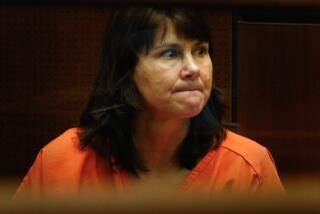N.Y. Parole Board OKs Freedom for 1960s Radical
NEW YORK — Members of the state parole board decided Wednesday that Kathy Boudin, a prominent 1960s radical, will be released from prison after serving 22 years in connection with an armored car robbery during which two police officers and a guard were killed.
Thomas Grant, a spokesman for the New York State Division of Parole, said a two-person hearing panel interviewed Boudin at the Bedford Hills Correctional Facility for one hour and 16 minutes before ruling in her favor.
The hearing officers, who called Boudin back into the room to announce she would be granted parole, did not issue a statement.
“We are overjoyed and very grateful,” said Leonard I. Weinglass, Boudin’s lawyer, who spoke briefly on the phone with his client.
“They ruled in my favor. I am going to get out,” Weinglass said Boudin told him. “She was very thankful. She sounded like someone who got the first piece of good news in 22 years.”
Weinglass said Boudin “is a fully rehabilitated person with an extraordinary record in prison.”
The nephew of Sgt. Edward O’Grady, who was killed by the robbers, said his uncle would have turned 55 years old Wednesday.
“I just hope Boudin is sincere in her claim to be a changed woman and no other family has to suffer like ours did,” John Hanchar told Associated Press.
Two previous panels turned down parole for Boudin, 60, a former member of the violent Weather Underground, which protested the Vietnam War.
While in prison, Boudin helped formulate programs for inmates with AIDS, developed a parenting program for incarcerated women with children and helped write a handbook for women whose children were in foster care.
She also earned a master’s degree in adult education.
But these accomplishments failed to sway parole board members in May and in August 2001.
“Release would so diminish the extreme seriousness of your crimes as to undermine respect for the law and the lives that were so tragically cut short on that October day in 1981,” members of the board wrote in May.
The May hearing took place after a court ruled that the board in its 2001 decision failed to take into account the recommendation of the judge who sentenced Boudin that she be paroled after 20 years for her role in the robbery.
Boudin was a fugitive when the robbery took place on Oct. 20, 1981. She had gained notoriety after escaping a tremendous explosion on March 6, 1970, that killed three people when it leveled a townhouse in Manhattan’s Greenwich Village being used by members of the Weather Underground to build bombs.
During the daylight attack on an armored car at a mall in Nanuet, N.Y., Peter Paige, a Brink’s guard, was killed and $1.6 million was taken by members of the Black Liberation Army and other radicals.
After abandoning their getaway car, the robbers, in an effort to avoid detection, entered a waiting U-Haul truck being driven by white radicals.
Boudin was in the passenger seat and fellow radical David Gilbert was behind the wheel when police halted the truck at an exit of the New York State Thruway.
Police, believing they had stopped the wrong vehicle, lowered their guard. Gang members burst from the truck firing automatic weapons. Nyack police officers O’Grady and Patrolman Waverly Brown were killed.
An off-duty New York City corrections officer captured Boudin as she ran from the scene.
She pleaded guilty to second-degree murder and first-degree robbery and was sentenced to 20 years to life.
At the time, Boudin said she was a last-minute addition to the gang, and was trying to surrender. She stressed that she did not take part in the attack on the armored car.
Boudin is the daughter of the late Leonard Boudin, who was a well-known civil rights lawyer.
When the robbery occurred, Boudin’s son was 14 months old. Friends raised the youngster, and he graduated from Yale University in May after receiving a Rhodes scholarship.
Grant said a transcript of Wednesday’s hearing would not be available for several days, and he expected Boudin to be released from prison by Oct. 1.
During her May appearance before the parole board, Boudin said she believed the money from the armored car would be used “to help the black community.”
She said at the time she thought “this is like Robin Hood taking from the rich and giving to the poor.”
Boudin said she had no role in the robbery’s planning and was not armed, labeling the crime “horrendous” and “horrible.”
“I don’t think there is any way to pay the debt for my being involved or participating in the crime that destroyed families and destroyed men,” she told the parole board. “It destroyed people who were defending their community from people like me. They were honorable, and I wasn’t.”
More to Read
Sign up for Essential California
The most important California stories and recommendations in your inbox every morning.
You may occasionally receive promotional content from the Los Angeles Times.










